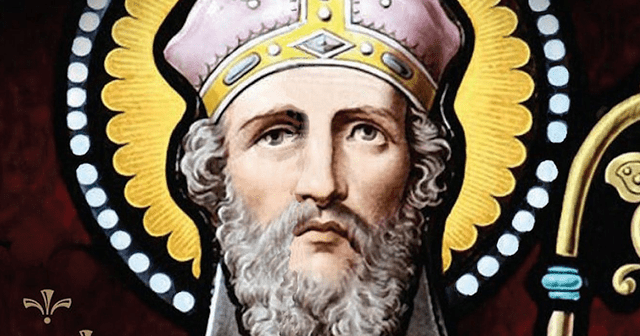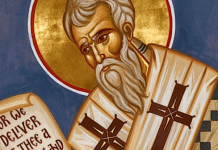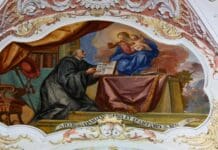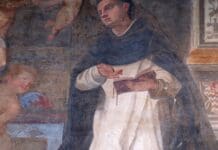Gundulf, a Lombard citizen of Aosta, and Ermenberga of Burgundian descent birthed Anselm. From his mother, Anselm inherited piety and a thirst for knowledge at an early age. His biographer, Eadmer, recounts childhood memories shared by Anselm, including a vision where he imagined Heaven atop the mountains surrounding his home.
As a child, Anselm attempted to join a monastery but was denied by the abbot, fearing parental backlash. He then prayed for illness to persuade the monks, but despite falling ill, he was still denied entry. This disappointment coincided with the loss of his mother, which weakened his initial resolve. His father’s harshness eventually drove Anselm from home, leading him to travel through Mont Cenis into Normandy.
In Normandy, Anselm found his calling at the Abbey of Bec under Lanfranc’s tutelage. His learning there prepared him for roles he initially resisted, such as prior and eventually abbot after Lanfranc. Anselm’s leadership at Bec was marked by his gentle handling of initial resistance and significant contributions to philosophy and theology.
Anselm’s election as Archbishop of Canterbury came at a turbulent time. He resisted the role but was compelled to accept by King William Rufus’s insistence and a dramatic public ceremony. As archbishop, he navigated conflicts with the monarchy over church freedoms and property, reinforcing the church’s autonomy from royal interference, particularly in the contentious issue of investitures.
His tenure faced numerous challenges, including disputes over the rightful pope, which led Anselm to Rome to argue his allegiance to Pope Urban II. Despite King Henry I’s repeated attempts to sway Anselm to accept royal investiture, Anselm remained firm, resulting in legislative changes that favored church authority.
Anselm’s philosophical contributions were profound, notably his ontological argument for God’s existence, which continues to influence theological and philosophical thought. His life, marked by devotion and intellectual rigor, made him a pivotal figure in religious and academic circles, respected for his moral and scholarly resolve.
Anselm’s writings, foundational yet not as frequently cited as other theologians, offer deep insights into Catholic doctrines. His thoughts on free will, the Holy Spirit, and atonement are particularly noted for their depth and foresight.
Photo credit: Public Domain via Wikimedia Commons


















Great Servant of God- St Anselm, Pray for us to God to be able to conquer the immoral and harsh world of ours.
pray oh St Anselme that i may think like you that i make not seek knowledge to believe but believe to have knowledge
[…] – Katie Richard, Ignitum Today Living in the New York Times World – God & Caesar Catholic Saint of the Day Is. . .(click here) – uCatholic For the GOD & CAESAR news website […]
ST. ANSELME, PLEASE PRAY WITH ME FOR MY SON TO BE LIFTED UP IN BODY AND SOUL BY OUR LORD JESUS CHRIST,AND TO BE HEAL’D.
The miracle gives me such joy Go dis trying to convince us that He truly alive – Oh that man will know His truths – YOU see I have had a miracle my picture of the Blessed Virgin wept blood – I showed the picture to my priest – There have been quite a few traumatic trails lately but my HOPE IS IN THE LORD HE IS OUR ROCK – Amen
[…] post Saint Anselm, Doctor of the Church appeared first on […]
Lord, my Lord, i offer you the longings of my heart.. You know them, Lord… Most esp. Juergen, nelson, linda, evie and those eho are sick and suffering..Thy will be done
I give thanks and Praise to Our Mighty God for all that HE is doing for us in our lives. Amen!
Dear God in the name of Jesus Christ our Lord have mercy on us Amen..
Saint Anselm, Doctor of the Church, pray for us!
Let me inhale contemplation, and exhale prayer. Thank you, St. Anselm, for your steadfast example, and please pray for those who think they’re intelligent but know nothing of God. Reconcile all scholars, writers, journalists, etc. to deep Faith so they can do less harm and more good, in The Holy Name of Jesus. Amen.
Saint Anselm pray for us amen.
Buy fiber optic cables, Cat6 cables, Cat5 Cables, ethernet cables, power cords, patch cables, HDMI and custom cables Shop for cables here Buy cables
O Heavenly Father i thank thee for thy blessed n Holy Clergy.we beg their prays that Jesus Christ bless us n keep us all in God mighty name amen